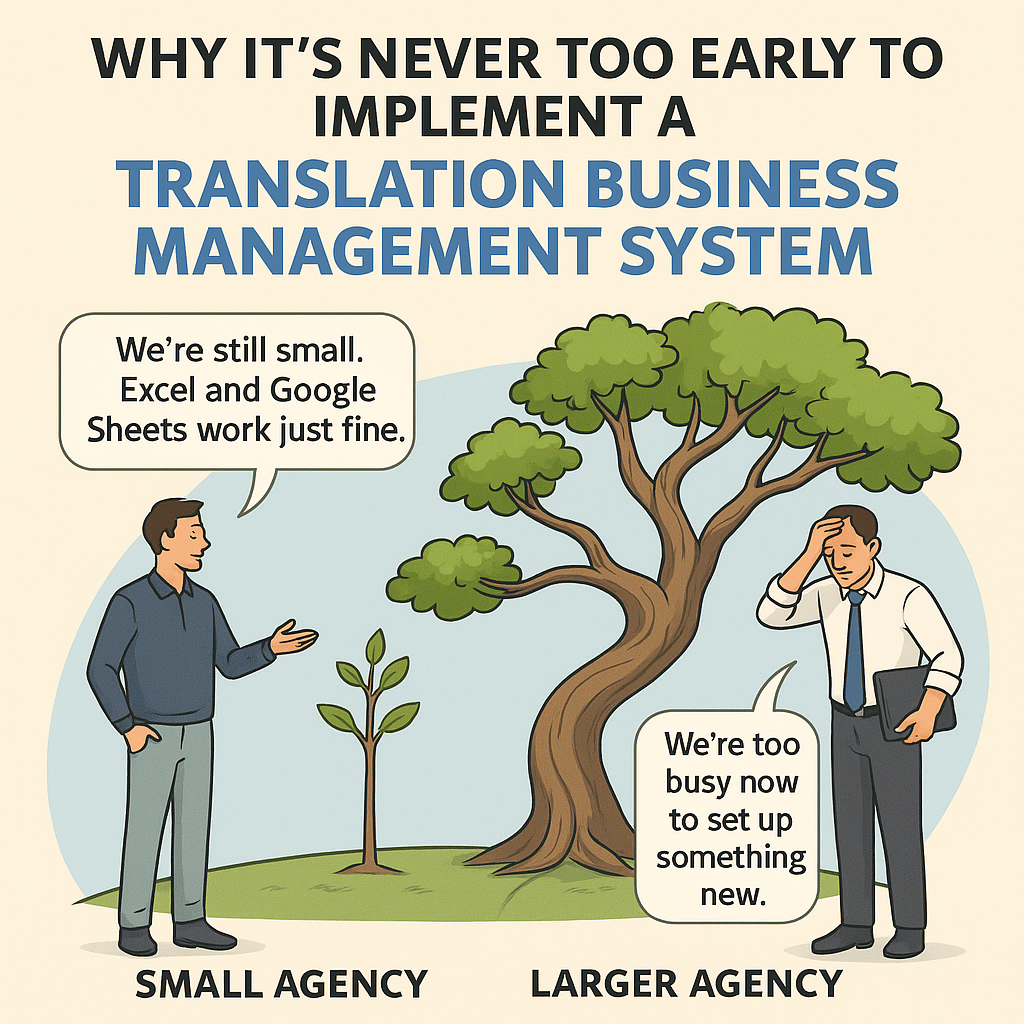
In the early stages of running a translation business, it's easy to rely on basic tools like Excel spreadsheets, email folders, and to-do lists. They’re familiar, simple, and—at first glance—good enough.
But as your business grows, so do the tasks, the files, the clients, the translators, the deadlines… and the risk of things slipping through the cracks. That’s why it’s never too early to implement a Translation Business Management System (TBMS).
Let’s dive into why.
The Conversation That Happens Too Often
Small agency owner:
"We’re still small. Excel and Google Sheets work just fine. A management system would be overkill for us."
Larger agency owner:
"We’re too busy now to set up something new. There’s no time to migrate everything while we’re handling so many projects."
This is a classic paradox—small companies think they’re not big enough to need a TBMS, while bigger ones think they’re too overwhelmed to implement it. Both are missing the point. When you are a small team, it’s easy to implement and make it organic part of your company. Later, it’s harder. Much like forming tree branches: while the tree is young, you can define it growth without hurting it and cutting unnecessary branches.
What Is a Translation Business Management System?
A TBMS is software designed specifically for the needs of translation businesses. It helps you manage:
- Projects and deadlines
- Clients and vendors
- Quotes and invoices
- Payments and reporting
- Files and communication
In short, it replaces a mess of disconnected spreadsheets and email chains with a central, streamlined system.
Why Small Agencies Shouldn’t Wait
Starting with a TBMS early builds your business on strong foundations. You don’t have to “un-learn” messy habits or spend time cleaning up disorganized data later.
Benefits include:
- Fewer admin mistakes (like forgetting deadlines or invoices)
- Faster client communication and quoting
- Instant access to client histories and rates
- A scalable process ready for growth
- Teamwork and unification
Bonus: Starting small means you can explore the system at your own pace, instead of trying to learn everything while juggling dozens of active projects. You won’t have much of a learning curve.
Why Larger Agencies Can’t Afford to Delay
If you’re already “too busy to implement a TBMS,” then you’re exactly the kind of business that needs one most.
Without it, you're likely:
- Wasting time on repetitive admin work
- Struggling to assign tasks across your team
- Delaying invoices or payments
- Missing growth opportunities because you're stuck in operational chaos
Yes, implementing a new system takes time—but the right TBMS is designed to make the transition smooth. Most platforms allow phased onboarding, data import tools, and training support. But as mentioned before, there is a learning curve you have to overcome. But postponing it will only make things harder.
Think of it this way: A few weeks of adjustment now can save you months of manual work over the next year.
Real-World Example
Imagine this:
Anna runs a boutique translation agency with 3 project managers and a team of freelance translators. They manage everything using Google Sheets, WhatsApp chats, and email folders. It works—until three clients ask for urgent projects at the same time.
Anna can’t remember who was assigned which job. One invoice goes out late. A vendor misses a deadline because the brief was buried in an email thread. A client is unhappy, and Anna is exhausted.
Now imagine if Anna had started using a TBMS six months earlier. Every project would be tracked. Invoices would go out automatically. Deadlines would trigger reminders. Vendor assignments would take two clicks.
Final Thoughts
The best time to implement a translation business management system is before you desperately need one.
- If you're small, use this time to build your workflow right.
- If you're growing, simplify and automate now—so you can scale with confidence.
Whether you’re managing 5 projects or 50, a TBMS helps you stay in control, look professional, and focus on what you do best: delivering great translations.



%20(1).png)

